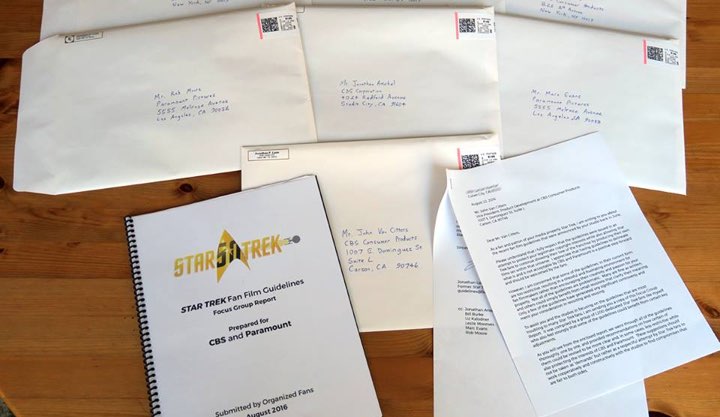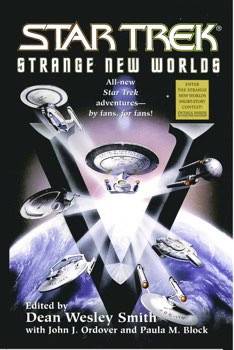This is an old revision of the document!

COORDINATED CAMPAIGN Axanar blogger Jonathan Lane hopes others follow his lead in writing CBS and Paramount officials urging changes to the fan film guidelines.
Axanar Supporters’ Report Critiques Fan Film Guidelines
Table of Contents
A group calling for a partial boycott of Star Trek: Discovery has submitted a report to CBS criticizing its fan film guidelines and calling for the studio to make specific changes.
The report, authored by fan film blogger and Axanar surrogate Jonathan Lane, is titled, “Star Trek Fan Film Guidelines: Focus Group Report, prepared for CBS and Paramount, submitted by organized fans, August 2016.” Its executive summary describes the group’s aim this way:
This group formed with the intention of seeking compromises, accepting these guidelines as a solid foundation and a positive move by the studios that may have simply reached a little too far.1)
CBS issued guidelines for fan films in June 2016 that assured producers the studio would not pursue legal action as it has with Axanar, against productions that adhered to the guidelines.
DOWNLOAD the full 38-page Fan Film Focus Group Report submitted to CBS and Paramount.
Letter-Writing Campaign
According to Lane, the report is the focus of what he hoped would be a letter-writing campaign to CBS officials urging them to change the guidelines:
Fans are invited to download and print this 37-page Focus Group Report and mail it to the CBS and Paramount executives listed below. An optional Cover Letter has also been provided for fans to include if they wish. The hope is that dozens or potentially hundreds of these reports will be mailed so that maybe, just maybe, the executives don’t throw them all in the trash and instead actually read a copy. That is our ultimate goal: to have these recommendations seen, read, considered, and hopefully acted upon rather than simply being ignored.2)
Strategy
Lane admits the campaign is something of a stunt. “Of course it is,” he said. “So was the original letter-writing campaign 48 years ago,”3) referring to the effort led by Star Trek fan Bjo Trimble that saved the original series from earlier cancellation. Lane adds:
While we might not get a hundred thousand people to all print 37 pages and mail an 8-ounce packet to the studios, what we lack in quantity, we can make up for in dedication and passion!4)
Lane urged letter-writers to mail the packages before Star Trek’s 50th anniversary on September 8, 2016, so “with luck, we’ll get some coverage in the media … and if that happens, hopefully the studios will give us their attention.”5)
Findings
Though described as a focus group report. the document is more accurately a summation of a variety of surveys conducted on the Facebook page of Project Small Access, a group led by active Axanar supporters.
The report states its results came from the responses of 1,200 self-selected Star Trek fans. Among its findings:
« We sincerely hope the studios will consider our concerns and perspectives in this matter as fans and patrons of your brand.» — Fan Film Guidelines Focus Group Report
- NO OBJECTIONS Nearly half the guidelines were considered by respondents as “fair and acceptable.”6)
- CONFUSING, VAGUE Another quarter of the guidelines were “determined to be either somewhat confusing or not specific enough.”7)
- SUGGESTED REVISIONS The group proposed revisions to clarify several guidelines, “protecting both the studios’ interests while also allowing fans more peace of mind in conforming their projects to those guidelines.”8)
- ‘PASSIONATE RESISTANCE’ Respondents objected to several guidelines “that drew passionate resistance” but attempted “to try to find common ground and compromise.”9), adding:
For the most controversial guidelines, the group can only share the depth of our concerns and hope that CBS and Paramount might respect our perspective on these matters in the hope there might be a middle ground where some of the most restrictive of the guidelines might be loosened—if only just a little. In this way, the studios can reach out to the fan community with a message of cooperation and back-and-forth constructive communication.10)
Most Objectionable Guidelines
Among the most objected-to guidelines were those:
- Restricting films’ run times and prohibiting series beyond two episodes, instead requesting that ongoing series be allowed, with run times of at least 30 minutes per episode.
- Prohibiting film industry professionals — particularly those who had previously worked on an official Star Trek production — from participating in a fan production, claiming the restriction is unenforceable under California law.
- Limiting crowdfunding to only $50,000 per 15-minute episode (up to maximum of two episodes), instead asking for a $150,000 limit.
DRAFT This article is still being drafted, so it should not be considered complete until this notice is removed.
Examining Each Guideline
- Guideline 5: No Professionals
-
- Full text
- The fan production must be a real “fan” production, i.e., creators, actors and all other participants must be amateurs, cannot be compensated for their services, and cannot be currently or previously employed on any Star Trek series, films, production of DVDs or with any of CBS or Paramount Pictures’ licensees.
- 'Unenforceable'
-
Respondents concluded this guideline is unenforceable under Section 16600 of the California Business and Professions Code, which states: “Every contract by which anyone is restrained from engaging in a lawful profession, trade, or business of any kind is to that extent void.”
ANALYSIS The report argues the guidelines are a contract, but cites no case law to support that conclusion. The guidelines are not rules prohibiting actions by either fan productions or industry professionals; they only provide guidance under which Star Trek’s copyright holders say they won’t sue for infringement.
Also, that California statute does not likely extend to a production that is violating the law — in this case, copyright.
What is Project Small Access?
What is Small Access' Connection to Axanar?

Officially, Axanar Productions, which is being sued by CBS and Paramount for copyright infringement is not a backer or sponsor of Project Small Access, with organizer Jonathan Lane claiming “the Small Access campaign is completely independent from anything Axanar” — on the regular blog Lane writes on Axanar’s website, which also hosts the downloadable PDF of the report.
And the administrators of the project’s Facebook group include Lane, pro-Axanar blogger Dave Heagney Jr. and Axanar’s official spokesman Mike Bawden. The group has 1,253 members.11)
Project Small Access is a group organized by leading Axanar supporters to protest CBS’ fan films guidelines by calling for a partial boycott of its new television series, Star Trek: Discovery, which will be broadcast on CBS’ online streaming service, CBS All Access. The boycott’s name is, of course, a play on the name of the network service.
The project was created by blogger Jonathan Lane on Axanar Productions’ fan film blog, “Fan Film Friday.” The group uses its Project Small Access Facebook group page to conduct its business.
The project was created to register some fans’ protest of the guidelines, reducing the network’s income by watching the new series in small groups, rather than through individual subscriptions.
However, CBS’ announcement that Star Trek: Discovery was already profitable without a single frame filmed, thanks to international licensing,12) frustrated more than one Small Access member.
Lane encouraged the group to focus efforts on gathering fan feedback to the guidelines and working to find compromise with the studios. The surveys took place over several weeks in summer 2016.
Headwinds and Tailwinds
In the report’s conclusions, Lane strove to make the case that some movement by the studios toward loosening up the guidelines would win back fans distracted and distressed by the Axanar lawsuit, which he suggested hurt Star Trek Beyond‘s box office:
The recent actions taken by both CBS and Paramount regarding fan films have turned a tailwind into a headwind. Fans who could have been dancing in the streets in their Starfleet uniforms and Klingon make-up instead were sitting at their computers typing up incensed blogs and arguing with each other on Facebook. … [When] young people saw news stories about studio lawsuits against the fans and restrictive new guidelines being imposed, they likely had second thoughts about jumping onto the warp-powered bandwagon.13)
Lane submitted no evidence, however, to back up his speculation in this part of the report, but said, “Having many Star Trek fans feeling frustrated and miserable certainly didn’t help boost revenue. In business parlance, the current mood of Star Trek fandom would be considered a ‘headwind.’”14)
Monetizing Fan Films
The report concludes with the often-heard proposal that CBS should allow fan films to earn revenue they would share with the studio: “Fan productions could, relatively easily, be turned into a source of millions of dollars of positive revenue … at a cost of the fraction of a single employee’s salary.”15)
The report, however, included no evidence to back up this kind of business plan. Even so, it went on to cite as an example Pocket Books’ “Strange New Worlds” project, which has published fan-submitted work as a book under the publisher’s banner, even though that effort isn’t a direct parallel to fan films. Pocket Books’ Star Trek titles are licensed, and therefore subject to the studios’ stringent restrictions regarding what can and cannot be published, which also apply to fan-submitted fiction.
Moreover, according to Axanar producer Alec Peters, CBS and Paramount exhibited no desire to accept such “money-making solutions” in their lawsuit‘s ongoing settlement talks. 
Keywords



